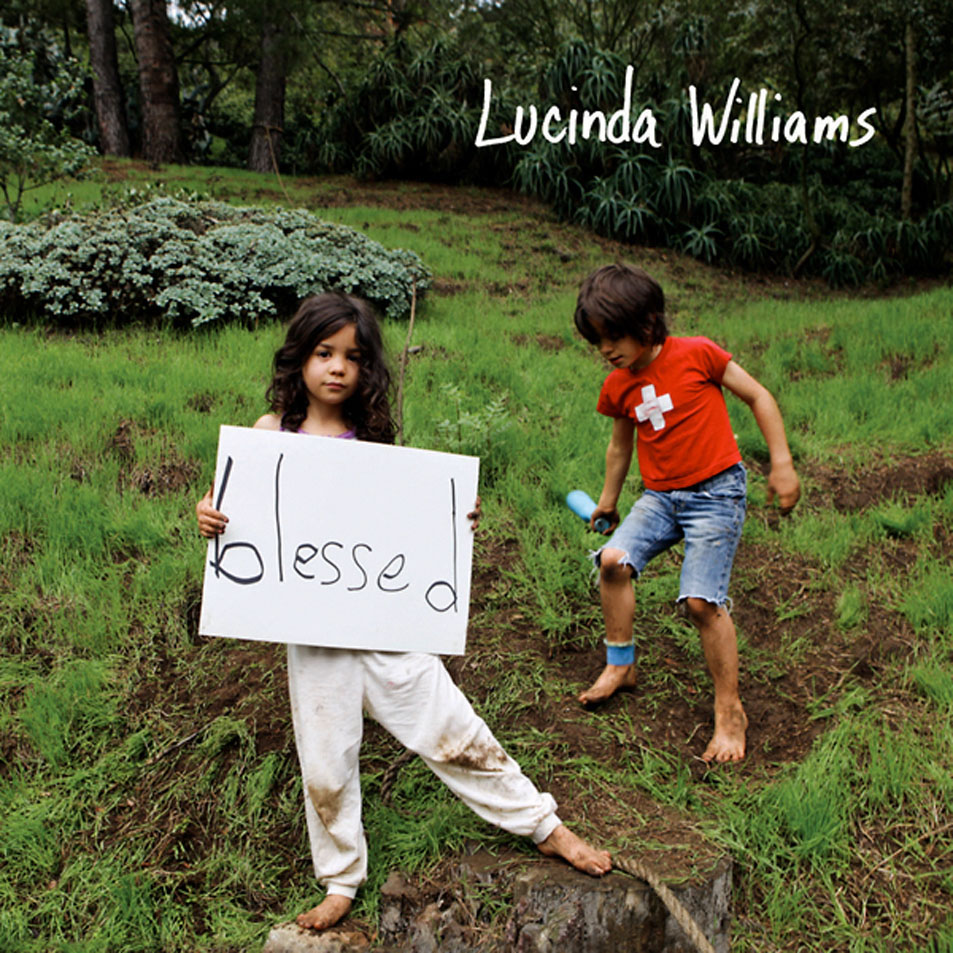
The Lowdown:
April 28, 2011
Lucinda Williams: Blessed
by Jason D. 'Diesel' Hamad
Poor, poor Lucinda Williams. The woman is a tortured genius. I have long maintained that Lucinda is the world’s second sexiest woman, next to MythBusters über geek-MILF Kari Byron. This ethereal attractiveness stems not from physical beauty or grace, but from her musical and lyrical brilliance, the pureness of her soul, and her willingness to bare that soul to the world. The problem is that her genius is only evident when she is unhappy. And these days, Lucinda seems to be a very happy woman, indeed.
Williams’ life can be described as a pair of intertwined, opposing spirals. Evident in her discography is the story of a woman progressively transforming from a happy-go-lucky folk singer into a bitter, worn down blueswoman, obsessed with the painful mendacity of life and the tragedies of those she encountered along the road. But as her personal stories have spiraled into oblivion, her musical power has reached ever skyward. Her particular talent has been in forging her anguish into finely crafted masterpieces. This culminated in 1998’s Car Wheels on a Gravel Road, not only her best album, but almost inarguably the best single work in the Americana genre, quite possibly any genre. Coming after a five-year working hiatus, it was filled with powerful ballads of alienation, love unrequited or just plain gone wrong, and the turmoil of a world chaotic and cruel.
That all changed with 2008’s Honey Bee. The sun broke through her perpetual gloom. She met a man whose favorite pastime wasn’t beating up women. He helped her find a fulfilling existence. She got engaged. She was genuinely happy. It showed in her music. That music sucked.
Well, ok, sucked is a strong word. It’s still Lucinda Williams, and Lucinda Williams playing a toy piano and singing her favorite jambalaya recipe would be far, far more glorious than Katy Perry in her most delusional dream of relevance. Yet, despite this album charting higher than any of her previous releases, the magic just wasn’t there. Gone were the sharp-tongued lashings of “You got no right to take my joy./ I want it back!” “Did you love me forever just for those three days?” or “You didn’t even make me…/ Come on!” and in their place were mushy tributes to the man who would hold her tight forever. From a critical standpoint: bleh! That’s not to say the album didn’t have a few highlights, but even when it rocked, the music on Honey Bee had lost the classic Lucinda edge that was her calling card of greatness.
With the announcement that Williams planned to release an album titled Blessed, my heart sank. Blessed? Blessed? This did not bode well for a return to the seedy, melancholic bar singer of old. While the worst of my fears did not pan out, neither were they entirely unfounded. The heady, lovey-dovey days of her betrothal seem to have faded just enough for the pain to start showing through. There are glimpses of her past glory on this album, but at best they are glimpses. Nothing compares to the pure, unadulterated, main-lined brilliance that was displayed on albums such as Car Wheels and West. What highlights there are come in the form of throwbacks to the bad old days, vague, dream-like remembrances of wrongs witnessed in a previous life, not the edgy pain of still-searing wounds.
One such retrogression is the first track, “Buttercup,” a fuck you to an abusive lover whose excuses have worn through. Though not a hard rocker by any means, it features a strong, bluesy guitar and that sassy Lucinda bite, evident in such lines as:
You might have a beautiful mouth, you might have beautiful eyes,
But sooner or later it all goes south
When you tell too many lies.
“Copenhagen” (while not—as I’d dared hope—a tribute to my favorite tobacco), is a haunting loss song. With no rock to it whatsoever, it is replete with eerie poetic imagery that recreates the surrealistic fog world familiar to anyone who has ever suffered a sudden revelation of shocking news. Williams pulls the listener right into her alienation and despair:
Walking through unfamiliar streets and shaking unfamiliar hands
And hearing unfamiliar laughs and lovely language I don’t understand.
It’s late October in Copenhagen. The skies are grey and the snow is falling.
I see my breath outside. I’m freezing. I’m motionless. I’m disbelieving.
The song, which focuses on the death of Williams' longtime manager Frank Callari several years ago, is also the subject of her first ever music video. The animated video, directed by Squidbillies co-creator (and big time alt.country fan) Dave Willis, adds an extra layer of weirdness to the song, exploring an alternative reality that leaves the listener no less haunted than the song itself.
Another highlight, the slow blues number “Soldier’s Song,” is the juxtapositional story of a soldier oversees thinking about the wife and child he left behind. While I would have been much prouder of the composition had it come at a time when it was less popular to criticize America’s involvement in its current conflicts, the song is a beautifully written, deeply personal illustration of the costs of war:
Why the hell did they send me here to fight?
Baby kisses my picture and turns off the light.
I can’t look my enemy in the eye.
Baby tells the little one daddy’s gone bye-bye.
Today I took a bullet through the heart.
Baby’s gonna have to make a brand new start.
The title track, a slow-paced but rocking blues number, is a long list of people who, in their own way, have bettered the lot of us. Surprisingly—given that the title frightened me so much—it has just enough of a twisted view that it avoids being sappy. Those featured are not the typical Übermenschen lionized by countless crappy balladeers, but the downtrodden who too often remain unmemorialized. A typical sampling insists:
We were blessed by the wounded man who felt no pain,
By the wayfaring stranger who knew our names.
We were blessed by the homeless man who showed us a way home.
… We were blessed by the forlorn, forsaken and abused.
Other songs on the album have their own distinct appeal. “Awakening” is trance inducing in its rhythmic torpidity and lyrical repetition, but transitions to a cymbal-crashing crescendo with striking blues guitar. “Seeing Black” might be one of Williams’ darkest compositions, which is saying a lot. Exploring the motives of suicide, it features well-crafted, powerfully sung lyrics and fiery guitar work by Elvis Costello. “Convince Me,” the pleadings of a vulnerable woman who can’t quite believe things are as good as they seem, features the kind of heartfelt vocal delivery that only Lucinda Williams can deliver.
The deluxe version of Blessed features a second disc with demo versions of the songs recorded solo in Williams’ kitchen. As is so often the case—especially with roots music—many of these early versions are superior to those in the final release. The sparse, stripped down feel allows the emotion and sincerity of her voice to come through strikingly. This is most evident in the song “Born to be Loved,” which though unimpressive in the regular release is beautiful and soulful in its starker guise where the blues singer in Lucinda really shines.
The true misses on the album are those songs that are just too blithe to be believed. “Sweet Love” definitely falls into this category. As she sings it:
Who would have ever guessed I would be here where I am like this,
With you my dear, my sweet, sweet, sweet love
To drink my words and to make each moment become a celebration.
The final track, “Kiss Like Your Kiss,” is filled with the same kind of vomit-inducing sentimentality.
I’m sorry, Lucinda. You’re the greatest writer of your generation and I… well I am not. But that’s just a suck sandwich right there. That’s the kind of scribbling you slip under your lover’s pillow, not release to the world. I award you no points and may god have mercy on your soul.
That said, born-again sentimentalist or not, Lucinda Williams is the greatest writer of her generation and this album is packed with the kind of brilliant wordsmithing that could only come from a master poet of her caliber. It is certainly a more uneven work than the greatest she has produced, but if we hold Hemingway up to the standards of The Old Man and the Sea, then The Sun Also Rises is a pile of tripe. Maybe I’m just spoiled. We can’t expect even the most talented of artists to be perfect every time. It is still far, far better an effort than virtually any other musician could muster. While a selfish part of me undeniably longs for the tortured genius to return to be a prophetess to her people, if her pain is necessary to reach the heights of greatness, well, it’s time the rest of the world sacrificed some so she can be happy. Mazel tov.
If you are a fan of Lucinda (as I obviously am), then by all means buy this album, and buy the deluxe edition. It is well worth adding to your collection and you will find among its tracks several that will fit into your “best of” playlist (even if none comes close to the splendor of “Joy” or “Are You Alright?”). If you aren’t a fan, you should be. Just start with Car Wheels on a Gravel Road and you’ll see why.
| mp3 | cd | vinyl | deluxe mp3 | deluxe cd |
|---|---|---|---|---|








